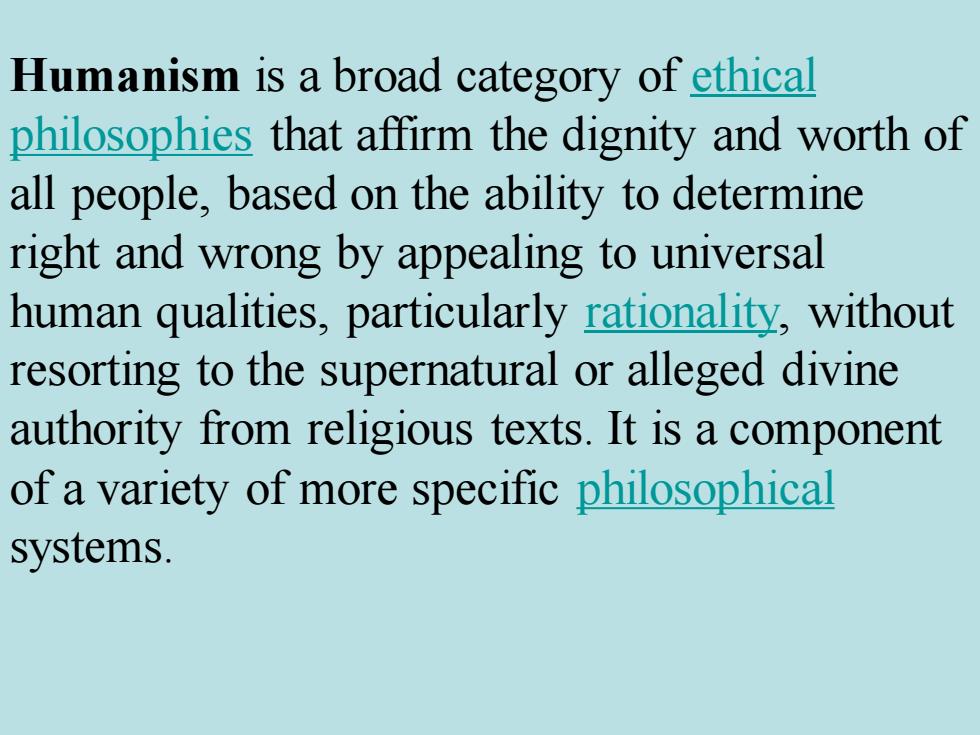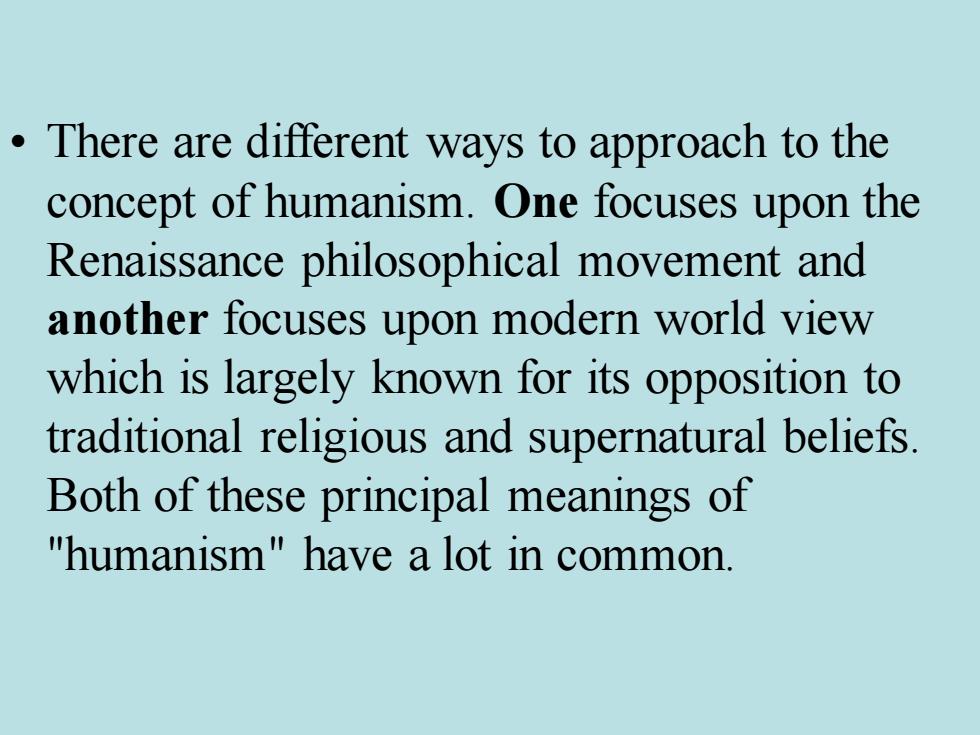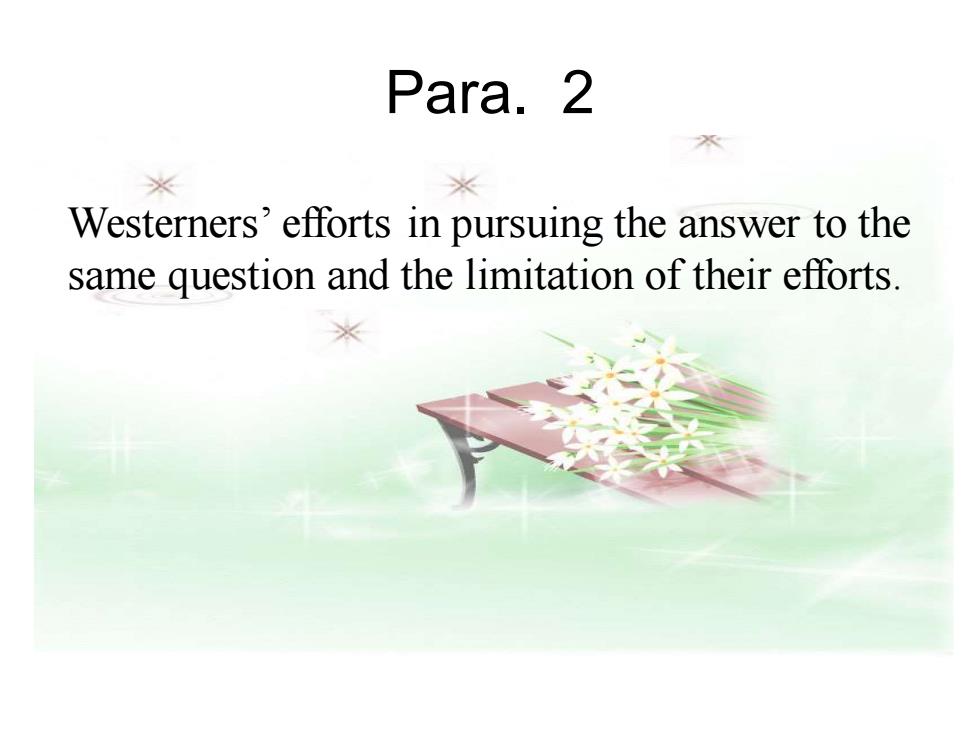
Unit7 TextI Chinese Humanism -By Lin Yutang
Chinese Humanism -By Lin Yutang Unit 7 Text I

Para.1 A very brief and efficient beginning,which makes clear the approach as well as the purpose of the article. Q:Why is the term humanism ambiguous?
Para. 1 • A very brief and efficient beginning, which makes clear the approach as well as the purpose of the article. • Q: Why is the term humanism ambiguous?

Humanism is a broad category of ethical philosophies that affirm the dignity and worth of all people,based on the ability to determine right and wrong by appealing to universal human qualities,particularly rationality,without resorting to the supernatural or alleged divine authority from religious texts.It is a component of a variety of more specific philosophical systems
Humanism is a broad category of ethical philosophies that affirm the dignity and worth of all people, based on the ability to determine right and wrong by appealing to universal human qualities, particularly rationality, without resorting to the supernatural or alleged divine authority from religious texts. It is a component of a variety of more specific philosophical systems

There are different ways to approach to the concept of humanism.One focuses upon the Renaissance philosophical movement and another focuses upon modern world view which is largely known for its opposition to traditional religious and supernatural beliefs Both of these principal meanings of "humanism"have a lot in common
• There are different ways to approach to the concept of humanism. One focuses upon the Renaissance philosophical movement and another focuses upon modern world view which is largely known for its opposition to traditional religious and supernatural beliefs. Both of these principal meanings of "humanism" have a lot in common

Three Aspects of modern humanism ·Religion Knowledge Optimism
Three Aspects of modern humanism • Religion • Knowledge • Optimism

X Chinese humanism Conception of the ends of Devotion to these ends Attainment of these ends human life
Chinese humanism Conception of the ends of human life Devotion to these ends Attainment of these ends

A Quotation "If a man finds that his nature tends or is disposed to one of these extremes.,he should turn back and improve,so as to walk in the way of good people, which is the right way.The right way is the mean in each group of dispositions common to humanity; namely,that disposition which is equally distant from the two extremes in its class,not being nearer to the one than to the other." -Maimonides
A Quotation • "If a man finds that his nature tends or is disposed to one of these extremes., he should turn back and improve, so as to walk in the way of good people, which is the right way. The right way is the mean in each group of dispositions common to humanity; namely, that disposition which is equally distant from the two extremes in its class, not being nearer to the one than to the other." — Maimonides

1.天命之谓性,率性之谓道,修道之谓教。(《中庸》第一章)。言 简意赅地揭示了中庸之道这一主题思想的核心是自我教育。 “天命之谓性”是指人的天性是善良的。 “率性之谓道”是说人们自我教育之道就是按照人们的善良的天性 办事情。 “修道之谓教”是说自我教育就是按照人道原则去进行修治。 2.中庸之道的理论基础:中庸之道的理论基础是天人合一。天人合 一的真实含义是合一于至诚、至善,达到“致中和,天地位焉,万 物育焉”、“唯天下至诚,为能尽其性。能尽其性则能尽人之性; 能尽人之性,则能尽物之性;能尽物之性,则可以赞天地之化育; 可以赞天地之化育,则可以与天地参矣”的境界。天人合一的天是 善良美好的天,天人合一的人是像善良美好的天那样善良美好的人, 天人合一就是人们自觉修养所达到像美好善良的天一样造福于人类 和自然理想境界
1. 天命之谓性,率性之谓道,修道之谓教。(《中庸》第一章)。言 简意赅地揭示了中庸之道这一主题思想的核心是自我教育。 “天命之谓性”是指人的天性是善良的。 “率性之谓道”是说人们自我教育之道就是按照人们的善良的天性 办事情。 “修道之谓教”是说自我教育就是按照人道原则去进行修治。 2. 中庸之道的理论基础:中庸之道的理论基础是天人合一。天人合 一的真实含义是合一于至诚、至善,达到“致中和,天地位焉,万 物育焉”、“唯天下至诚,为能尽其性。能尽其性则能尽人之性; 能尽人之性,则能尽物之性;能尽物之性,则可以赞天地之化育; 可以赞天地之化育,则可以与天地参矣”的境界。天人合一的天是 善良美好的天,天人合一的人是像善良美好的天那样善良美好的人, 天人合一就是人们自觉修养所达到像美好善良的天一样造福于人类 和自然理想境界

Para.2 米 Westerners'efforts in pursuing the answer to the same question and the limitation of their efforts
Para. 2 Westerners’ efforts in pursuing the answer to the same question and the limitation of their efforts

米 teleology As a school of thought it can be contrasted with metaphysical naturalism,which views nature as having no design or purpose.Teleology would say that a person has eyes because he has the need of eyesight (form following function),while naturalism would say that a person has sight because he has eyes (function following form).In European philosophy,teleology may be identified with Al stotelianism and the scholastic tradition.Most theology presupposes a teleology:design in nature can be used as a teleological argument for the existence of God. Aristotle's analysis of four causes speaks of a material cause,efficient cause,and formal cause but all these serve a final cause
teleology • As a school of thought it can be contrasted with metaphysical naturalism, which views nature as having no design or purpose. Teleology would say that a person has eyes because he has the need of eyesight (form following function), while naturalism would say that a person has sight because he has eyes (function following form). In European philosophy, teleology may be identified with Aristotelianism and the scholastic tradition. Most theology presupposes a teleology: design in nature can be used as a teleological argument for the existence of God. Aristotle's analysis of four causes speaks of a material cause, efficient cause, and formal cause but all these serve a final cause